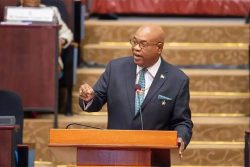The Health Ministry has come under the microscope again for drug purchases made in breach of procurement laws, according to the 2007 Auditor General’s Report, which has also revealed that some supplies sourced from the New Guyana Pharmaceutical Company Inc. (New GPC) are still outstanding after two years.
The Ministry was rapped in the last report for previous purchases from the New GPC, which were flagged by the Auditor General for being in breach of the Procurement Act since they were made on the basis of a Cabinet approval (CP (2003)11:4:M of 2003). The 2007 report, which was circulated yesterday in the National Assembly, noted that in July last year, “Cabinet granted its ‘no objection’ to the National Procurement and Tender Administration Board (NPTAB) procedures being waived to facilitate selective tendering for the Ministry to purchase drugs and medical supplies” up to December 31, 2009.
According to the report, the Ministry explained that it continued to use the Cabinet decision since it did not specify a time period and amount. However, it added that “the Ministry is now in compliance with the Procurement Act” as a result of the new Cabinet Approval that was received in July last, and that “the Ministry is applying for the NPTAB’s approval for each procurement.”
The Public Accounts Committee (PAC) of the National Assembly has continued to raise concerns about the purchases sourced from the New GPC without being subject to a competitive tendering process. Former PAC Chairman Winston Murray has said the Ministry’s actions are in breach of the Procurement Act and has denounced Cabinet’s arrogation to itself of the authority to waive the tender procedures as being illegal. Only Monday, the issue resurfaced at a PAC meeting, where it was revealed that three contracts totalling US$4.2M ($850M) that were awarded to the New GPC for the supply of drugs for the health ministry had not been subject to a formal tendering process.
The Auditor General’s report found that the Health Ministry expended $1.2 billion on “Materials Equipment and Supplies” in 2007, including $1.115 billion for the purchase of drugs and medical supplies from specialised agencies locally and overseas. Of that figure, drugs and supplies purchased locally were put at $1.008 billion, comprising 53 contracts totalling $996,046 million that exceeded the Ministry’s $600, 000 authority limit, and 105 contracts totalling $16,214,000 for purchases below the limit.
An audit examination of the payment vouchers in relation to the New GPC revealed that supporting documents such as copies of contracts, goods received notes, delivery notes, etc. were not attached. Additionally, during 2007 seven payment vouchers totalling $9.380 million had no supporting documentation attached to indicate whether the drugs had been received from the suppliers. Further, the report said there was also evidence that the Ministry was receiving drugs in 2009, which were paid for in 2007. “It is apparent that the Ministry may still have outstanding drugs yet to be supplied for payments made in 2008,” it added, explaining that “it was difficult to determine whether the Ministry had received drugs for the amounts expended for the period under review.”
The Ministry said it is in the process of locating the supporting documents while the Audit Office has recommended that measures be put in place to ensure that the stores procedures are carried out with regards to accounting for the receipt and have reconciliation done for drugs received and outstanding from its suppliers.
Meanwhile, purchases were made from agencies overseas at a cost of $106.358 million, with adherence to Tender Board procedures for only one purchase which fell within a $250,000 to $600,000 authority limit. The 10 other overseas purchases, exceeding $600,000 and totalling $105.890 million were made from specialised overseas agencies utilising the 2003 Cabinet approval.
In response, the Ministry explained that it continued to utilise the Cabinet approval, which did not include a time period or an amount. The report, however, restates that that the Ministry is now in compliance with the Procurement Act as a new Cabinet approval was received in July 2008 which will expire in December 2009 and that the Ministry is applying for the NPTAB’s approval for each procurement.
In the 2006 report, the Auditor General noted that amounts totalling $608M were spent by GPHC on drugs and medical supplies but that it could not completely account for these purchases since there was no central point of accountability. The response of the GPHC, according to the report, was that the corporation had no control over the Materials Management Unit staff since they came directly under the Ministry of Health. The audit office report then pointed out that contracts worth $430M were entered into with NGPC but added that there was “no evidence to indicate that tender board procedures were adhered to.” Questions had been raised about this in the light of the deal between the government and NGPC’s parent company, QA11, for the divestment of the Sanata Textiles site and also the controversial concessions that were announced for the group and which were not catered for by law.
In light of recurring breaches, Murray has been a vocal critic of Cabinet’s role in the process and has been calling for the establishment of the Public Procurement Commission, which has a constitutional mandate to monitor the performance of procurement bodies for adherence to regulations and efficiency in procuring goods and services as well as in the execution of works.








